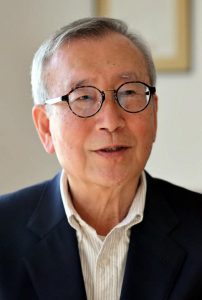To Nihon Hidankyo upon receiving Nobel Peace Prize: Tadatoshi Akiba, former mayor of Hiroshima, says A-bomb survivors taught me the spirit of reconciliation, not retaliation
Nov. 28, 2024
A-bomb experience should be made a field of study
Mr. Akiba said he was pleased and at the same time felt relieved by the awarding of the Nobel Peace Prize to the Japan Confederation of A- and H-Bomb Sufferers Organizations (Nihon Hidankyo).
With the issues surrounding Ukraine and the Palestinian-controlled Gaza, I think the Nobel Committee wanted to send a message to Russia and Israel not to use a nuclear weapon and to cease fire as soon as possible. Another important point, in terms of timing, is that the prize should be given while there are still atomic bomb survivors who are healthy. The number of survivors is dwindling. If the award were not granted now, it will be too late.
He has long campaigned for the Nobel Peace Prize to be awarded to atomic bomb survivors or the Nihon Hidankyo. In the 1980s, he proposed to translate “Hiroshima no Kiroku” (in English, ‘Record of Hiroshima’), a photo album published by the Chugoku Shimbun to commemorate the 35th anniversary of the atomic bombing of Hiroshima. When the English version of the book was published, he sent a copy with a letter to the Nobel Committee. In the draft of his first Peace Declaration after becoming mayor of Hiroshima in 1999, which he read out on the day of the bombing, he expressed his gratitude to the atomic bomb survivors.
They were part of the letter of recommendation I sent to the Nobel Committee explaining why the survivors should receive the prize. First, it is their courage that they chose to live in a miserable condition where no one would blame them even if they chose to kill themselves. Second, the fact that their appeal, “No one else should have to endure the same kind of suffering,” has prevented a third nuclear attack, which the Nobel Committee calls a “nuclear taboo.”
Third, their philosophy of “reconciliation, not retaliation.” I have learned from many survivors to have the heart to understand the pain of others.
One of them is Akihiro Takahashi (died in 2011 at the age of 80), former director of the Hiroshima Peace Memorial Museum.
In 1980, I accompanied Mr. Takahashi as a translator to Washington, D.C., where the atomic bomb exhibit was held, and met with Paul Tibbets, captain of the Enola Gay, the bomber that dropped the bomb on Hiroshima. Mr. Tibbets said at that time that he would drop the bomb again if ordered to do so. I really could not believe that he would say that.
Then he went on to explain the reason: because it was a war, and a war had to be avoided. Mr. Takahashi responded to his explanation by saying: “I agree with you. War is wrong. Let you and I work together so that there will be no war.” It was a classic example of the “reconciliation, not retaliation” spirit.
While serving as president of Mayors for Peace, he developed an action plan to eliminate nuclear weapons by 2020. He is now thinking carefully about what action the A-bombed city of Hiroshima should take on the basis of the Peace Prize.
First of all, considering a time when there will be no atomic bomb survivors alive, their experiences should be made a field of study at the university level. Then, what is important for the abolition of nuclear weapons is that non-atomic bomb survivors, who are the overwhelming majority, become the “Hiroshimans” who share the philosophy of reconciliation based on the survivors’ experience and the goal of creating a peaceful world free of nuclear weapons.
Nihon Hidankyo’s winning of the prize may be a sign that next year’s 80th anniversary of the bombing should be used as a starting point. With the goal of eliminating the weapon by the next milestone, the 100th anniversary, we have to develop a concrete plan of action and spread the movement throughout Japan and the world. I think this is what the Nihon Hidankyo should do in the future.
(Interviewed by Kohei Okata, Staff Writer)
Profile
Tadatoshi Akiba
Born in Tokyo, Mr. Akiba completed his graduate studies at the Massachusetts Institute of Technology, in the United States. After serving as an associate professor at Tufts University, professor at Hiroshima Shudo University, and member of Japan’s House of Representatives, he served as mayor of Hiroshima from 1999 to 2011. He has been a representative of the Hiroshima Congress against A- and H-Bombs since 2016. He is 82 years old.
(Originally published on November 28, 2024)








